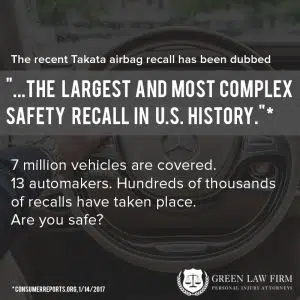Check the Truck & Car Airbag Recall List
Click here…
The Biggest Auto Recall in American History Could Be in Your Driveway…

Takata Corporation, a Japanese parts manufacturer, is responsible for millions of faulty airbags getting installed into cars that we share the road with every day; approximately 42 million vehicles are potentially affected.
This… is huge.
So huge, in fact, that the National Highway Traffic Safety Administration has dubbed this the “largest and most complex safety recall in U.S. history.”
NBC News has reported that 11 people in the country have died as a result of faulty manufacturing, 180 individuals have been hurt, and over seven million cars have been affected by this now infamous auto recall. Is the airbag recall on your radar? If not, there’s a good chance it should be! We’re sharing the details, what you need to know and what to do if you believe you could be driving a car covered by the recall!
What’s Wrong With The Takata Airbag Anyway?
To put it bluntly… they explode. Literally. And while most airbags inflate at a rapid, life-saving speed, the bags covered in this recall explode with shrapnel into the faces of the lives they are designed to protect. The defective inflator and propellant devices deploy improperly, shooting metal shards into the vehicle occupants. Some of the reasons claimed by Takata, and reported by reputable news outlets, include that:
- Propellant chemicals were mishandled and improperly stored during the assembly process, causing the metal airbag inflators to potentially burst from the inside out due to excessive pressure.
- Humid weather exasperating conditions.
- Rust, bad welds, and gum (yes, chewing gum) had dropped into at least one inflator.
According to Consumer Reports, the “NHTSA has determined the root cause of the problem: airbags that use ammonium nitrate-based propellent without a chemical drying agent. As postulated early on, environmental moisture, high temperatures, and age as associated with the defect that can improperly inflate the airbags and even send shrapnel into the occupant. To date, there have been 11 deaths and approximately 180 injuries due to this problem in the U.S. Through various announcements, the recall has tripled in size over the past year. It is expected that the inflator recall will impact 42 million vehicles in the U.S., with the total number of airbags being between 64 and 69 million.”
Reports state that, in 2002, Takata’s plant in Mexico produced a rate of defects six or eight times above standard acceptable limits. For every one million parts shipped, 60 to 80 were defective.
The Takata airbag recall has been in development for years. In 2014, the New York Times reported that the company knew about the issue as far back as 2004, when they (allegedly) issued secret tests to explore the problem; although they confirmed a potential issue, Takata never informed federal safety regulators, choosing instead to destroy data and get rid of the physical evidence.
In short, Takata knew they had a problem – a big problem – and they didn’t move to protect people till it was too late. The history of the case is long and convoluted, with both Takata making strong claims and brutally defending themselves.
What Cars Have Takata Airbags In Them?
The short answer is — a lot. So many, in fact, that it’s hard for them to be listed here in one place. However, according to Car and Driver, the following manufacturers and vehicle models and years have been affected:
Acura
more than 387,000 vehicles
- 2002–2003 3.2TL
- 2003 3.2CL
- 2003–2006 MDX
- 2005–2012 RL
- 2007–2016 RDX
- 2009–2014 TL and TSX
- 2010–2013 ZDX
- 2013–2016 ILX (including hybrid)
Audi
- 2004–2008 A4
- 2005–2008 S4
- 2003–2011 A6
- 2006–2013 A3
- 2006–2009 A4 cabriolet
- 2007–2008 RS4
- 2007–2009 S4 cabriolet
- 2007–2011 S6
- 2008 RS4 cabriolet
- 2009–2012, 2015 Q5
- 2010–2011 A5 cabriolet
- 2010–2012 S5 cabriolet
- 2016–2017 TT
- 2017 R8
BMW
more than 1.97 million vehicles
- 2000–2011 3-series sedan
- 2000–2012 3-series wagon
- 2002–2013 3-series coupe and convertible
- 2001–2013 M3 coupe and convertible
- 2002–2003 5-series and M5
- 2003–2013 X5
- 2007–2010 X3
- 2008–2013 1-series coupe and convertible
- 2008–2011 M3 sedan
- 2008–2014 X6 (including hybrid)
- 2011–2015 X1
Buick
- 2015 LaCrosse
Cadillac
- 2007–2014 Escalade, Escalade ESV
- 2007–2013 Escalade EXT
- 2015 XTS
Chevrolet
more than 1.91 million including Buick, Cadillac, GMC, Saab, and Saturn
- 2007–2014 Silverado HD, Suburban, and Tahoe
- 2007–2013 Avalanche and Silverado 1500
- 2015 Camaro, Equinox, and Malibu
Chrysler
- 2005–2015 300
- 2006–2008 Crossfire
- 2007–2009 Aspen
Daimler
- 2006–2009 Dodge Sprinter 2500 and 3500
- 2007–2017 Freightliner Sprinter 2500 and 3500
- 2008–2009 Sterling Bullet 4500 and 5500
Dodge/Ram
more than 5.64 million including Chrysler, not including Daimler-built Sprinter
- 2003–2008 Ram 1500
- 2003–2009 Ram 2500
- 2003–2010 Ram 3500
- 2004–2009 Durango
- 2005–2008 Magnum
- 2005–2011 Dakota
- 2006–2015 Charger
- 2008–2014 Challenger
- 2008–2010 Ram 4500 and Ram 5500
Ferrari
more than 2820
- 2009–2014 California
- 2010–2015 458 Italia
- 2012–2016 Ferrari FF
- 2012–2015 458 Spider
- 2013–2017 Ferrari F12berlinetta
- 2014–2015 458 Speciale
- 2015 458 Speciale A
- 2015–2017 California T
- 2016–2017 Ferrari F12tdf
- 488GTB, and 488 Spider
- 2016 Ferrari F60
- 2017 Ferrari GTC4Lusso
Fisker
- 2012 Karma
Ford
3 million, including Lincoln and Mercury
- 2004–2011 Ranger
- 2005–2006 GT
- 2005–2014 Mustang
- 2006–2012 Fusion
- 2007–2010 Edge
GMC
- 2007–2014 Sierra HD, Yukon, and Yukon XL
- 2007–2013 Sierra 1500
- 2015 Terrain
Honda
11.4 million, including Acura
- 2001–2012 Accord
- 2001–2011 Civic (including hybrid and NGV)
- 2002–2011, 2016 CR-V
- 2002–2004 Odyssey
- 2003–2015 Pilot
- 2003–2011 Element
- 2006–2014 Ridgeline
- 2006–2010, 2012 Gold Wing motorcycle
- 2007–2013 Fit
- 2010–2015 Accord Crosstour
- 2010–2014 Insight and FCX Clarity
- 2011–2015 CR-Z
- 2013–2014 Fit EV
Infiniti
- 2001–2004 I30/I35
- 2002–2003 QX4
- 2003–2008 FX35/FX45
- 2006–2010 M35/M45
Jaguar
- 2009–2015 XF
Jeep
- 2007–2016 Wrangler
Land Rover
more than 68,000
- 2007–2012 Range Rover
Lexus
- 2002–2010 SC430
- 2006–2013 IS
- 2007–2012 ES
- 2008–2014 IS F
- 2010–2015 IS C
- 2010–2017 GX
- 2010–2015 IS convertible
- 2012 LFA
Lincoln
- 2006–2012 Lincoln Zephyr and MKZ
- 2007–2010 Lincoln MKX
Mazda
more than 733,000
- 2003–2011 Mazda 6
- 2006–2007 Mazdaspeed 6
- 2004–2011 RX-8; 2004–2006 MPV
- 2004–2009 B-series
- 2007–2012 CX-7
- 2007–2015 CX-9
McLaren
- 2011–2015 P1
- 2012–2014 MP4-12C
- 2015–2016 650S
- 2016–2017 570
- 2016 675LT
Mercedes-Benz (1,044,602, including Daimler)
- 2005–2014 C-class (excluding C55 AMG but including 2009–2011 C63 AMG)
- 2007–2008 SLK-class
- 2007–2017 Sprinter
- 2009–2012 GL-class
- 2009–2011 M-class
- 2009–2012 R-class
- 2010–2011 E-class sedan and wagon
- 2010–2017 E-class coupe
- 2011–2017 E-class convertible
- 2010–2015 GLK-class
- 2011–2015 SLS AMG coupe and roadster
Mercury
- 2006–2011 Milan
Mitsubishi
more than 105,000
- 2004 Lancer Sportback
- 2004–2007 Lancer
- 2004–2006 Lancer Evolution
- 2006–2009 Raider
- 2012–2017 iMiEV
Nissan
more than 1,091,000, including Infiniti
- 2001–2003 Maxima
- 2002–2004 Pathfinder
- 2002–2006 Sentra
- 2007–2012 Versa
Pontiac
more than 300,000
- 2003–2010 Vibe
Saab
- 2003–2011 9-3
- 2005–2006 9-2X
- 2006–2009 9-5
Saturn
- 2008–2009 Astra
Scion
- 2008–2015 xB
Subaru
more than 380,000
- 2003–2014 Legacy and Outback
- 2003–2006 Baja
- 2004–2011 Impreza
- 2006–2014 Tribeca
- 2009–2013 Forester
- 2012–2014 WRX and WRX STI
Tesla:
- 2012–2016 Tesla Model S
Toyota
6 million, including Lexus and Scion
- 2002–2007 Sequoia
- 2003–2013 Corolla and Corolla Matrix
- 2003–2006 Tundra
- 2004–2005 RAV4
- 2006–2012 Yaris
- 2010–2016 4Runner
- 2011–2014 Sienna
Volkswagen
more than 680,000
- 2006–2010, 2012–2014 Passat sedan and wagon
- 2009–2017 CC
- 2009–2013 GTI
- 2010–2014 Jetta SportWagen and Golf
- 2010–2014 Eos
- 2013 Golf R
- 2015 Tiguan
Now That I Know The Takata News, What Should I Do?
First and foremost, check to see if your vehicle is covered in this recall. If it is, contact your dealer immediately. Dealers are doing repairs and replacements 100 percent free! While the wait times for replacement parts may vary, a recall means that you (the driver) has no liability or responsibility for the faulty part!
If you have been in an accident and you believe your airbag was defective and should have been included in the Takata recall, contact an attorney for help! Your case could be a complex, intensive and lengthy process; it’s to your advantage to have a car accident attorney working on your behalf! New updates happen in this case every day. As more automakers are added, developments are coming to light about knowledge Takata had about this dangerous situation! An experienced attorney can keep you updated and educated on what ways, if any, this recall affects the outcome of your recent car accident claim.
Looking for more information? Check out the following resources we’ve compiled:
- This post on the Car and Driver blog which has a time-stamped chronical of recall updates, making it easy for you to follow developments from the beginning.
- Consumer Reports unbiased and action-oriented information on the full scope of the recall.
- The definitive website of information direct from the NHTSA, with a list of affected vehicles and timeline of events.


